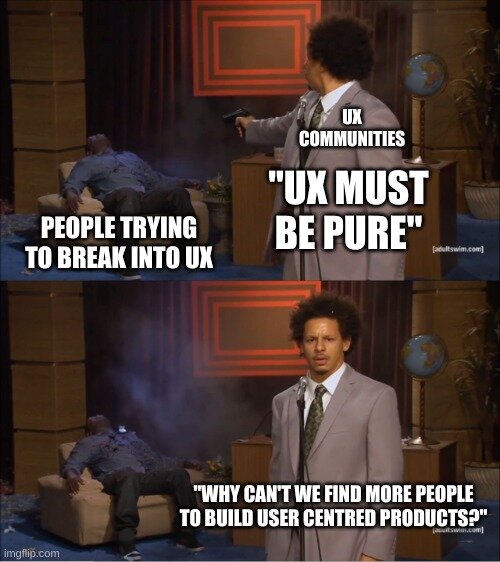Hello!
Today I decided to write a little bit about an insidious problem I’ve observed within the UX community. Now I know ‘design Twitter’ and ‘design Linkedin’ are crawling with people desperate for engagement and telling people just how amazing they are. I mean, I know, I attempt to do some shameless self promotion despite how awful I am at it (internal shudder). Recently though I’ve been thinking about the long term negative impact of the culture surrounding UX and the discourse from some of those people who work in the UX-sphere. The snark, smug, self-satisfied attitude is bleeding out, and potentially the way people perceive user experience as a career field worth exploring, and getting people interested in user centred design and discipline will negatively be impacted.
It feels like not only are large areas of the sphere gatekeeping, they’re digging moats and filling them with condescending traps.
What do I mean by this? Where’s my evidence? What have I seen? WHO HURT ME?! Well, let’s look at the language and discourse we use to describe things. We use words and terms that make things sound far more complicated than they are in a way to shut down views and build barriers to entry.
Discourse is incredibly important, something I will wax lyrically about for hours if I get the chance. Yes, we have terms to describe specific instances, yes we use words that describe specific methodologies and ways we conduct analysis, but why do we use them? Is it a signifier to others to say ‘I know what I’m talking about, trust me’, or is it a way to say ‘I know what I’m talking about, this big word, do you know it? If you don’t, shut up and let me work’?
Do we use acronyms to save time? Or do people use them to exclude those who don’t know what they mean?
I’ve come across people who in the same conversation lament that they can’t find good people to work in UX, whether it be in content, research or interaction design, whilst at the same time smugly professing their own prowess and how unique they are. Smugly critiquing the work of others whilst questioning why they can’t find people to work with. Nobody likes smug, it’s the worst emotion.
If people are wanting to run a research project, can you help them? In any way? Many teams work in an agile way, or are trying to. Iterate, work with them. If they can only get 4 interviews with users initially, don’t shut them down and say they haven’t got enough to make decisions. They may not, but speaking to some users is better than speaking to none. Explain why they may need to speak to more users, explain the dangers of confirmation bias.
Share why things matter instead of criticising it not being done ‘right’.
Sometimes we don’t have time to do full ethnographies, sometimes we have lower sample numbers than we’d like, sometimes the entire prototype falls over when testing. We adapt, learn, iterate and share. Share your resources, share best practices and spend time coaching people.
Over the last couple of years I’ve been working on projects that don’t have typical user interfaces, where we’re looking to understand the full end to end process for multiple stakeholders with varying needs and determining if a product or a service is even required at all. The process has been quite technical and our stakeholder base don’t currently have the time/understanding/need to use technical tools, we just need to identify if there’s a problem, and then, what’s the best way to solve it and or add value. As a result when we’ve come to share our research findings I’ve needed to develop some inventive visualisations including memes, proto-personas and drawn style decks, affectionately described by some as ‘colouring-in’ and others as ‘that thing that Jason does’.
Look! A meme! It conveys something simply!
The goal of presenting findings in this way is to be wholly inclusive to our stakeholders, boiling down our findings into simple understandable concepts and metaphors which can be shared and memorable. If we don’t have a UI we can map findings on to, we have to come up with ways to share that insight, set expectations and benchmark what we’re doing.
At no point are we speaking down to people, we are engaging stakeholders and guiding them. Helping them where we can. We should strive to do the same with those who are looking to learn about UX principles and how to work together.
I’ve come across charlatans, frauds, snake oil salesmen in the past. They’re insidious, odious and can totally derail a project. I get it. But how we deal with these people and drive them out of organisations isn’t by locking ourselves in towers of UX-purity. It’s by taking everyone with us, building bridges and ensuring that everyone is involved in research and analysis. Whether it’s taking part in long form interviews, workshops, affinity sorting or even just lurking on a product test, by sharing our knowledge and expertise. That way, more people will be able to sift through the buzzword bingo in vampiric brochures.
There’s a definite lack of junior roles for those moving into UX to learn, whilst I’m not in a position to hire people and train them, if those opportunities aren’t there, I’m more than happy to help those who ask for guidance on how to break into user research.
Yes, I will still send snarky tweets now and again, but never to tear people down, more to express frustration at organisations and systems. I’m more than happy to volunteer my time outside of work to help people learn about how I work, why I do the things that I do. I’ve done it in the past and helped people get into user research roles.
I want to help build a community where I’m happy working with other like minded people, open the gates, not keep them.






